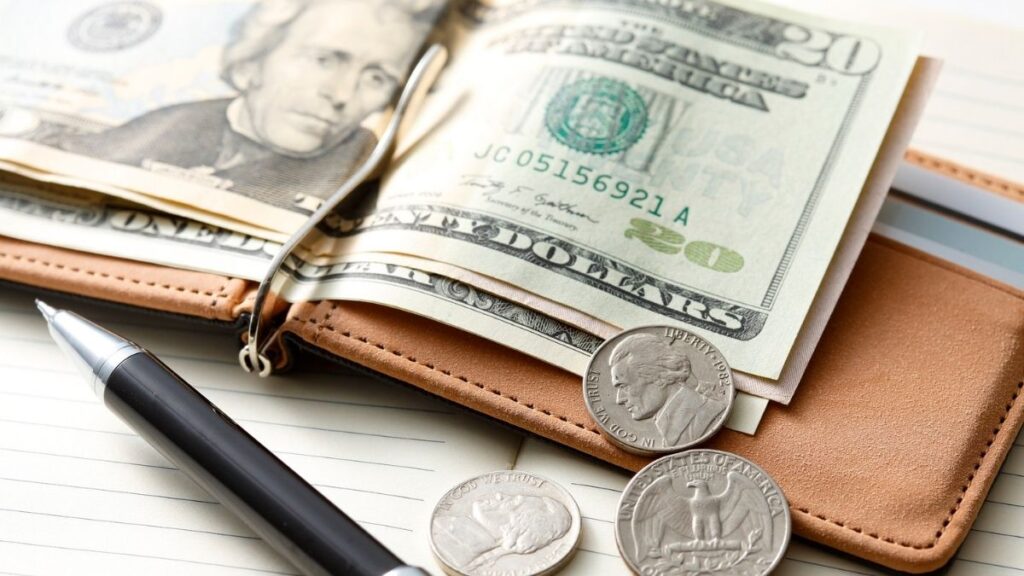I was 30 years old and making six figures before I realized I was still hiding money in my sock drawer—a habit from when my childhood home wasn’t always secure.
Growing up in poverty doesn’t just limit your resources; it rewires your brain, creating lasting neural pathways that perpetuate financial anxiety and self-limiting behaviors long after your bank account recovers.
This scarcity mindset becomes the invisible barrier between you and financial peace. In this guide, you’ll discover evidence-based techniques from financial psychology to recognize these ingrained thought patterns and practical methods to transform them into abundance thinking—because your past shouldn’t determine your financial future.
How Growing Up in Poverty Shapes Your Brain’s Relationship with Money
Your brain learned about money when you were young. If you grew up poor, your brain built special pathways to help you survive. These pathways made sense when you had nothing. But now they might be holding you back.
Scientists call this a scarcity mindset. It’s not just in your head. It’s actually in your brain structure. Research shows that growing up in poverty changes how your brain processes money decisions. Your neural pathways—the highways your thoughts travel on—get built around fear and survival.

Here’s what happens: When you’re a kid without enough food or heat, your brain goes into protection mode. It learns to worry about money constantly. It learns that spending is dangerous. It learns that there’s never enough. These lessons get hard-wired into your thinking patterns.
The numbers tell a harsh story. Studies from 2024 show that 67% of adults who grew up poor still struggle with financial anxiety. Even when they earn good money. Even when their bank accounts are healthy. The poverty is gone, but the brain patterns remain.
Your brain also learned to think short-term. When you’re poor, you can’t plan for next year. You need to survive today. So your brain got really good at immediate threats. It got bad at long-term opportunities. This affects how you assess risk now. A smart investment looks scary. A stable job feels like the only safe choice.
💡 Tip: Start noticing when you feel panicked about money. Write it down. Just awareness helps. You’re not broken—your brain learned to protect you. Now you’re teaching it something new.
7 Signs Your Childhood Poverty Is Still Controlling Your Financial Decisions
You check your bank balance five times a day. Your heart races each time. This is hypervigilance. Your brain thinks it needs to monitor threats constantly. It’s still in survival mode from years ago.

You have the money for new tires, but you wait. Your tooth hurts, but you skip the dentist. You put off the leaking roof. This isn’t about the money. It’s about feeling safe spending it. Your brain learned that spending money means you’ll run out. So it blocks you from buying even necessary things.
You make decent money now. But you still buy the cheapest everything. You eat damaged produce. You wear clothes with holes. Your friends call you cheap. But it’s not about being cheap. It’s extreme frugality driven by fear. Your brain can’t believe the money will last.
Big purchases feel like jumping off a cliff. Buying a car makes you sick for weeks. Signing a lease feels like signing your death warrant. Your hands shake. Your stomach hurts. Other people don’t feel this way about normal purchases. But your childhood poverty taught your brain that big spending equals danger.
💡 Tip: Before your next necessary purchase, talk to yourself like you’d talk to a scared friend. Say it out loud: “I have the money. This is safe. I’m not that kid anymore.” It sounds silly. It works.
What My Scarcity Mindset Was Costing Me (Beyond Just Money)
Your scarcity mindset costs you opportunities. You see a good investment. Your brain screams danger. You watch others build wealth while you stay frozen. It’s not that you’re dumb. Your brain’s trying to protect you from a threat that’s no longer there.

Your relationships suffer too. Your partner wants to take a vacation. You get angry. They don’t understand why you freak out over spending. They think you don’t trust them. But really, you don’t trust that the money will last. Money fights aren’t about money. They’re about your brain’s fear patterns.
💡 Tip: Tell the people close to you what you’re dealing with. Say: “I grew up poor, and it makes me scared about money sometimes.” Most people will understand. It stops the fights before they start.
Your body pays a price. Chronic financial stress raises your blood pressure. It messes up your sleep. It makes you sick more often. Your brain’s constant worry signal sends stress hormones through your body all day. This isn’t healthy. But your brain doesn’t know the difference between real danger and remembered danger.
Changing Your Money Story: Cognitive Techniques to Challenge Poverty Thinking
Your thoughts about money aren’t facts. They feel like facts. But they’re just thoughts your brain learned a long time ago. Cognitive behavioral therapy can help you separate feelings from reality.

Here’s a thought-challenging exercise. Write down a money thought that scares you. Maybe it’s “If I spend this, I’ll end up homeless.” Then ask yourself: What’s the evidence for this? What’s the evidence against it? What would you tell a friend who said this? Your brain needs you to question its old programming.
Financial therapists use specific journal prompts to dig up your core beliefs. Try this one: “Money is _____, and that makes me feel _____.” Fill it in ten different ways. You’ll see patterns. Maybe money feels dangerous. Maybe it feels temporary. Maybe it feels like power other people have but you don’t.
💡 Tip: Start a “money truth” list on your phone. When you make a purchase and nothing bad happens, write it down. “Bought groceries. Still have money. I’m okay.” Your brain needs repeated evidence that spending is safe now.
Gradual Exposure: Training Your Brain to Feel Safe with Money
Your brain learned to fear spending through repeated experience. You can teach it new patterns the same way. This is called exposure therapy. You start small and work up to bigger challenges.

Make a list of money actions that scare you. Rank them from 1 to 10. A 1 might be buying a fancy coffee. A 10 might be investing in the stock market. Start with a 1 or 2. Do it even though it feels wrong. Notice that nothing bad happens. Your brain starts learning.
💡 Tip: This week, do one level-1 money thing that feels slightly uncomfortable. Maybe you buy the name-brand item instead of generic. Sit with the discomfort. Watch it pass. Watch nothing bad happen.
Finding Your Financial Tribe: Community-Based Approaches to Abundance Thinking
The people around you affect your money mindset. If everyone in your life is scared about money, that fear spreads. If you’re around people who make healthy money decisions, you learn from them.

Research from 2024 shows that your financial habits sync with your closest friends. This isn’t about dumping your old friends. It’s about adding new perspectives. You need to see examples of people who grew up like you but learned to think differently about money.
💡 Tip: Join one online community this month for people working on their money mindset. Reddit has r/povertyfinance and r/MoneyTherapy. Just lurking helps. You’ll see you’re not alone. You’ll learn new strategies.
Financial education matters. But not the kind that makes you feel dumb. Look for 2025 resources made for people with financial trauma. The Financial Therapy Association has free webinars. The Abundance Academy offers courses designed for people who grew up poor. These aren’t get-rich-quick schemes. They’re classes that understand your specific brain patterns.
Find a mentor if you can. Someone who grew up like you but figured out the money stuff. They don’t need to be rich. They just need to be healthier about money than you currently are. Coffee once a month can change your perspective.
When to Consider Professional Help for Financial Trauma
Sometimes DIY isn’t enough. If your money anxiety stops you from functioning, you might need professional support. There’s no shame in this. You wouldn’t fix your own broken leg. Some brain patterns need professional help too.

Financial therapy is a real field now. It combines money education with psychological support. It’s not the same as a financial planner. Planners tell you what to do with money. Financial therapists help you figure out why you can’t do it. Both can be useful. But if your problem is emotional, you need the therapist.
💡 Tip: Ask yourself: Is my money fear stopping me from basic adult tasks? Am I avoiding bills, taxes, or necessary purchases? If yes, consider professional help.
Here are signs you might benefit from a professional. You can’t open your bills. You avoid dealing with money completely. Your money anxiety causes panic attacks. Your relationships are breaking down over money. You’ve tried self-help for months and nothing’s changed.
Different types of professionals help different problems. Financial therapists deal with the emotional side. They help you process trauma and change thought patterns. Financial planners help with the practical side. They create budgets and investment strategies. Psychologists who specialize in anxiety can help if your money fear is part of a bigger anxiety disorder. Sometimes you need more than one.
You Can Rewire Your Brain’s Money Patterns
Your brain is plastic. That’s the scientific term—neuroplasticity. It means your brain can change. The pathways built by childhood poverty aren’t permanent. You can build new ones. It just takes time and repetition.

Healing financial trauma is a process, not a one-time fix. You didn’t learn your money fear in a day. You won’t unlearn it in a day. Some weeks will feel like progress. Some weeks you’ll feel back at square one. Keep going. Your brain is learning even when it doesn’t feel like it.
💡 Tip: Start with one small technique this week. Pick the easiest one from this article. Maybe it’s the daily money truth reminder. Maybe it’s buying one $5 item without guilt. Just one small thing. That’s how change starts.
You made it out of poverty. That took incredible strength. Now you’re doing something even harder—healing the wounds poverty left behind. You’re not just surviving anymore. You’re learning to thrive. And that scared kid inside you needs to know: You’re safe now. The money is real. You earned it. And you’re allowed to believe it will be okay.
Your childhood poverty shaped you. It doesn’t have to control you. The fact that you read this whole article proves you’re ready to change. You’re questioning the old patterns. That’s the first step. The hardest step. Everything else is just practice.
This week, do one thing different with money. Just one thing. Notice how your brain reacts. Notice that you survive it. That’s how you teach your brain a new truth about money. One small action at a time.

